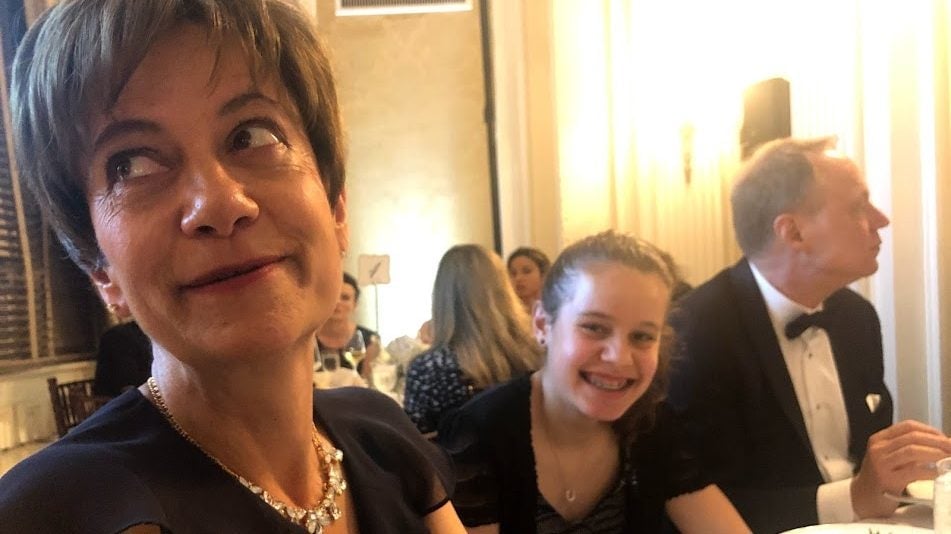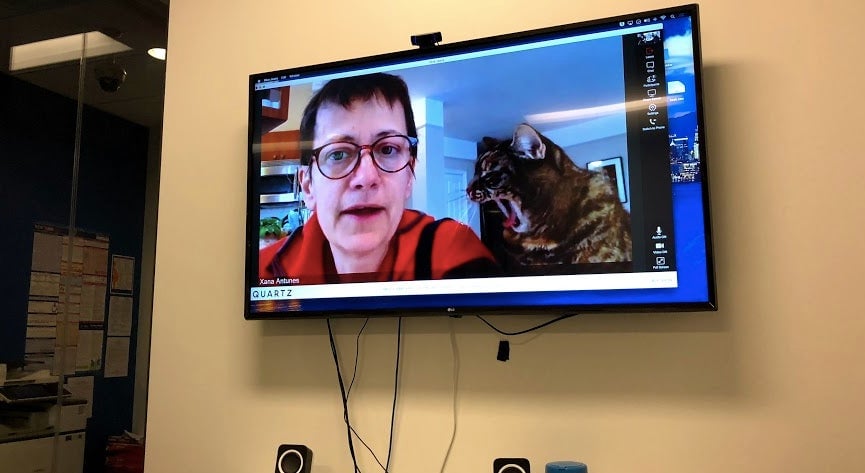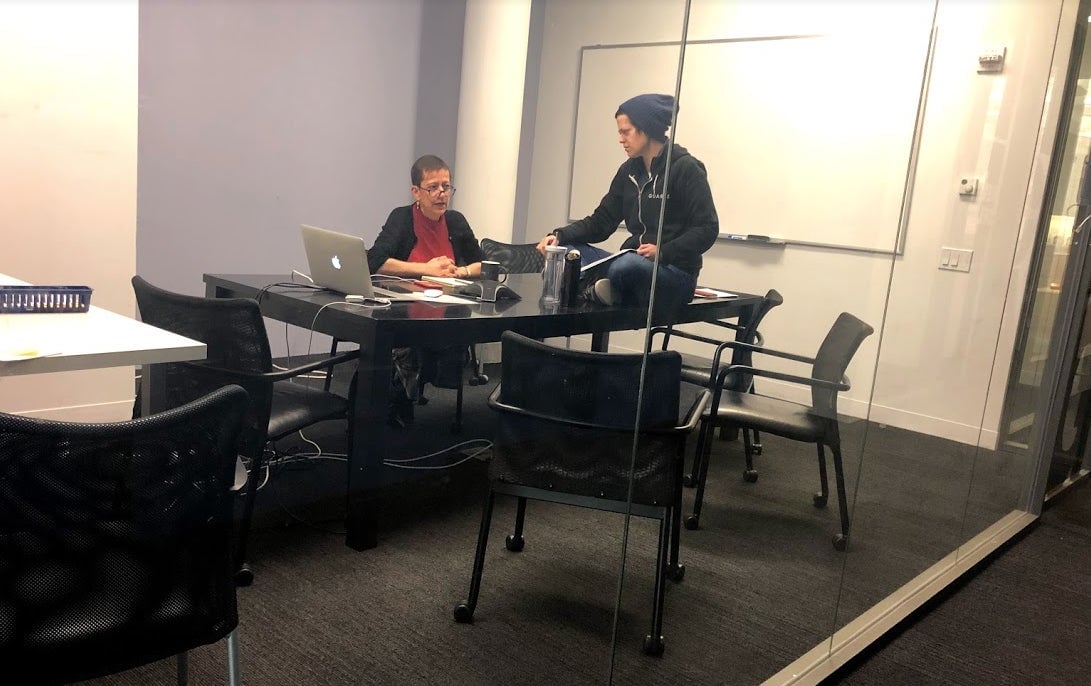Remembering Xana Antunes, a mentor to just about everyone she met
To understand Xana Antunes, you have to understand what she’d say in this moment. Confronted with reverent recitations of her professional accomplishments; with quotes and anecdotes from the people whose lives she touched; with overwrought musings on mortality; Xana, reading a draft of her own remembrance, would peer at me over the top of her glasses, raising both eyebrows as she pushed down her laptop screen. “Well it’s all just a bit morbid, isn’t it?” she’d say. “Honestly, you don’t even need the first half.”


To understand Xana Antunes, you have to understand what she’d say in this moment. Confronted with reverent recitations of her professional accomplishments; with quotes and anecdotes from the people whose lives she touched; with overwrought musings on mortality; Xana, reading a draft of her own remembrance, would peer at me over the top of her glasses, raising both eyebrows as she pushed down her laptop screen. “Well it’s all just a bit morbid, isn’t it?” she’d say. “Honestly, you don’t even need the first half.”
Xana Antunes, executive editor of Quartz, died on Jan. 27 after a too-short (and yet heroically long) battle with pancreatic cancer. The first in a long list of ways I will miss her: that she isn’t here to edit this.
Xana joined Quartz in 2014, when the newsroom was a mere two years old and imbued with the kind of magic that comes from putting a few dozen smart journalists in a room together and letting them get weird. She was excited by the young company’s approach to news, and bemused by its lack of bureaucracy. (I wasn’t at Quartz then, but over dinner in her first month, Xana piqued my interest by describing its culture with exasperated affection. “They have no meetings!” she said. “The inmates are running the asylum.”)

I first met Xana in 2008, when she was the incoming editor of Crain’s New York Business, and I was a 22-year-old web producer there. It was my first real job, and I was baffled by the fact of it, half-expecting her first priority to be ferreting out and firing me, the least experienced person in the room. Instead, Xana zeroed in on the website, giving me opportunity after opportunity to share ideas, propose projects, take on responsibility, and try new challenges. When she left Crain’s, we kept in touch, and her sage wisdom informed many of my career choices over the subsequent years. In 2016, I jumped at the opportunity to join her at Quartz. That I was able to spend the past four years working side by side with Xana is something I’ll always cherish.
She’d never lord it over you, but Xana had serious news chops. Born in Scotland, she moved from London to New York in 1993. (She would always say that she wanted to be a foreign correspondent, but ended up staying indefinitely at her first posting.) She went on to serve as editor of the New York Post, executive editor at Fortune and CNNMoney.com, editor of Crain’s New York, and executive editor and vice president at CNBC Digital. She knew everyone in financial journalism. And she had an appetite for disruption (a phrase I’m sure she’d cut) that perpetually drew her to the future of news and newsrooms, not just by virtue of joining Quartz but also once she got here. When a new idea needed incubation–Quartz’s video strategy, its opinion strategy, its editorial hiring strategy, its membership program, its editorial R&D team—Xana became its shepherd. She was a tough critic, a fierce advocate, an incisive editor, and the kind of mentor who would roll her eyes if you called her one to her face.
She was also warm, and idiosyncratic. Conversations with Xana tended to devolve in the best way, until you’d accidentally steamrolled through an extra 45 minutes hashing out everything and nothing at all. She had a way of convincing you that her ideas were your ideas, a Xanception that often resulted in people accepting and succeeding at new challenges. She used the Pret A Manger app religiously, and unabashedly ate breakfast in 9am meetings. Her cat Mitzi often prowled through her video calls when she worked from home. She kept a tight list of each day’s to-dos in the top right corner of her notebook, and could whisper at exactly the right volume to gossip in an open-plan office without being overheard. She loved Cheez Its. She eschewed bullshit.

But it was Xana’s openness to new ideas, her lack of preciousness, that constituted a superpower. In editorial strategy, it enabled a nimbleness necessary for any media organization to succeed in trying, challenging times. As a colleague, it moved mountains. Xana was a leader who welcomed any idea from any person, someone whose mind could be changed on most things, who respected talent and generosity more than eons of experience or buckets of self-assurance. Xana made people more confident in themselves—not because she treated them with kid gloves, but because it never dawned on her to bother.
Sarah Todd, a Quartz senior reporter, put it succinctly: “If Xana thought you were good, you didn’t need anything else. You could fly.”
Unthinkably, Xana’s death follows that of Lauren Brown, editor of Quartz special projects, who passed away in October. Lauren wrote regularly about her experience with cancer, and her words continue to echo around our newsroom, and our hearts. “Happiness is not a feeling, but an orientation” goes a memorable Lauren piece on finding joy in one’s 30s. “My life is no more of a struggle than anyone else’s,” reads another, on her diagnosis. “In one form or another, we’re all trying to survive until that’s no longer an option. Facing that reality requires as much bravery as it takes, every day, to endure the constellation of tragedies that make up a life.”
Xana, too, rejected added attention to her struggle with cancer. When she first told me she’d been diagnosed, it was in the same tone I might use to say that Starbucks ran out of half-and-half. She bore months of treatment with such unshakeable zen that it was hard not to follow her lead, to feel that one needn’t mount a visible protracted fight with cancer, but rather pish-posh it into embarrassed, cowed submission.
“Xana was surprisingly frank when we talked about her health,” Oliver Staley, Quartz’s lifestyle and culture editor, shared in the newsroom Slack today. “We talked about her wig shopping, her surgeries, her frustrations. I remember being astonished by her forthrightness. She knew exactly what she had and what the odds were, but she wasn’t going to let that knowledge slow her down or stop her from getting the next membership field guide out. That she kept working until the virtual end was both remarkable and typical.”

Just three months ago, while accepting a lifetime achievement award from the Newswomen’s Club of New York, Xana talked about telling her school’s guidance counselor, at age 15, that she wanted to be a journalist. “She said, ‘Oh no, that’s ridiculous. Why don’t you think about teaching or nursing?’ It was by no means the first time or the last time that I and thousands of women have been brought short by low expectations,” Xana said. “But low expectations, it turned out, also had an upside. Because the cost of failure was negligible. I could just try anything and then just be completely shocked when I succeeded. And that really has been the story of my career.”
In the months and years ahead, I suspect I won’t draw on specific words of wisdom from Xana, but instead on this—on Xana herself, on the playbook she left us for living by doing it so openly and relentlessly. Try anything, it goes. Believe in yourself. Advocate for yourself. Get over yourself. Speak up. Listen. Be decisive. Be flexible. Learn from everyone around you. Question your assumptions. Don’t suffer fools. Don’t indulge bullshit. And really, you don’t even need the first half.